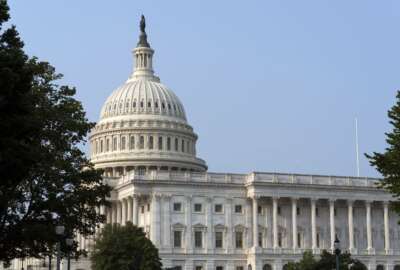To listen to the Federal Newscast on your phone or mobile device, subscribe in PodcastOne or Apple Podcasts. The best listening experience on desktop can be found using Chrome, Firefox or Safari.
- Agencies are not expected to face cuts from sequestration in 2021. New data from the Congressional Budget Office showed that the appropriations had not exceeded the statutory budget caps. The CBO said the caps could still be breached if lawmakers appropriate additional money before Sept. 30. CBO is required to submit a report to Congress by Aug. 15 each year about whether agencies are likely to breach the budget caps. This is the last year that sequestration is possible as the statutory caps expire at the end of fiscal 2021.
- New salary caps mean House staffers can now make up to nearly $200,000 a year. The new salary caps, approved by House Speaker Nancy Pelosi (D-Calif.), mean staff could earn more than most House lawmakers, which earn $174,000. The recommendation to raise the cap came from House Administration Committee Chairwoman Zoe Lofgren (D-Calif.) and the House Select Committee on the Modernization of Congress. Pelosi, in a letter to members, said the new salary cap will allow lawmakers to recruit and retain a diverse pool of experts.
- Kaiser Permanente will soon offer vaccine incentives for federal workers. Anyone vaccinated under the Federal Employees Health Benefits plan are eligible to receive $50 starting Aug. 15. The rewards will be added to their Kaiser Permanente health payment card, which can be used to pay for dental treatments, prescription eyeglasses and contact lenses, among other things. Federal workers are eligible for the reward until the end of the year. All they need to do is have their medical records show they’re fully vaccinated.
- The Department of Homeland Security didn’t wait long to name a new chief procurement officer. DHS picked Paul Courtney to be its new chief procurement officer. He replaces Soraya Correa, who retired at the end of July after more than six years in the role. Courtney has been the deputy CPO since June 2019, joining the agency from the FBI. He worked at the FBI for six years before moving to DHS. Courtney also worked at the Defense Intelligence Agency. Courtney inherits an acquisition budget of more than $7 billion across the department, 75% of which is spent on service contracts.
- The Government Accountability Office is denying two bid protests on the military’s massive household goods contract. American International Movers claimed the solicitation was unduly restrictive. The company also claimed that the solicitation inaccurately reflected the agency’s needs and objectives. The denial is one step in the Defense Department continuing to centralize how it hires contractors to move goods.
- Coronavirus was impacting the military weeks before the first domestic case was identified, according to a new report. The Defense Health Agency said COVID-19 was moving around domestic military bases in February 2020. That is nearly a month because the Defense Department acknowledged its first domestic case publicly in mid-March 2020. Since then more than 325,000 DoD-related COVID cases have been identified. DHA said the military needs to study the early emergence of coronavirus on the population to better prepare for the next health crisis. DoD is expected to mandate vaccines for service members by mid-September at the latest.
- The Federal Aviation Administration recommends building a launch pad for commercial rockets to be built on Cumberland Island on the Georgia coastline, but the National Park Service isn’t on board. The Park Service said the chance of explosive misfires over federally protected land that is popular with tourists constitutes an “unacceptable risk.” The county in question – Camden County, Georgia – has been trying for nine years to build “Spaceport Camden”, which would be the 13th licensed commercial spaceport in the country. FAA called the location the “preferred alternative” and predicted minimal risks to the island’s wild horses, sea turtles and nearly 60,000 visitors each year. (Federal News Network)
- NASA, the Army and Navy want to keep partnering with universities on aircraft technology innovations. Their Vertical Lift Research Centers of Excellence have been a good source of innovation, research and future engineering talent. The Centers were renewed for another five years and are trying to create a dual use technology base for the military aviation and NASA’s Advanced Air Mobility mission. Lead schools for these Centers are the University of Maryland, Penn State University and Georgia Tech.
- The Small Business Administration is gearing up to take over work for the Department of Veterans Affairs. Starting in 2023, SBA will certify veteran-owned small businesses and service-disabled veteran-owned small businesses. Congress moved this program to SBA under this year’s National Defense Authorization Act. Bibi Hidalgo, the associate administrator of SBA’s Office of Government Contracting and Business Development, said she’s met with VA Secretary Dennis McDonough to ensure a seamless transition. “We want to make sure all of that is really well in place before we need to launch in 2023.” (Federal News Network)
Copyright
© 2024 Federal News Network. All rights reserved. This website is not intended for users located within the European Economic Area.





